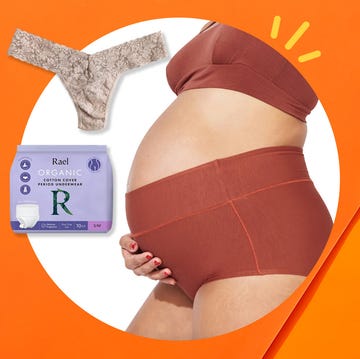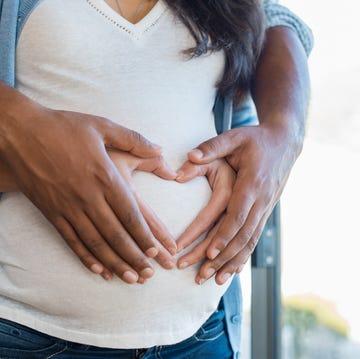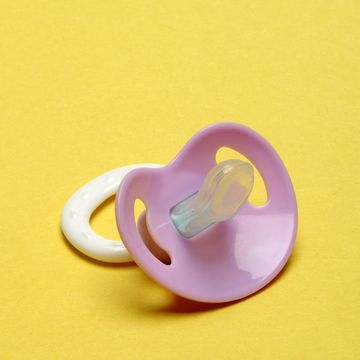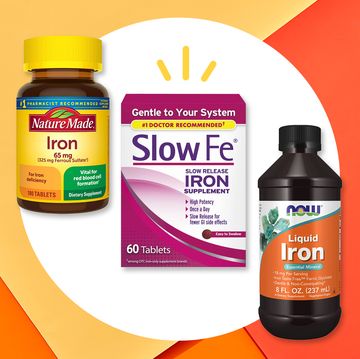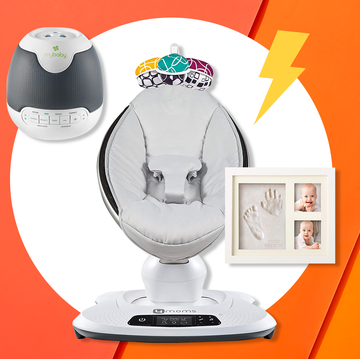It might seem like life as a celebrity is easy-peasy, but famous women have real-world issues, too. Last week, Tyra Banks and Chrissy Teigen got frank about their tough struggles with fertility. In an episode of the daytime talk show FABLife, they both opened up about how hard it’s been to conceive. Tyra described the pressure to seem normal throughout the process: “You put needles in your tummy every day and have to come to work and smile when you feel like you want to throw up and lie down.”
Here, four women describe what they wish they’d known before going through the process and how their attempts to get pregnant turned out.
“I’ve been through IVF three times because I carry some cells that have just one X chromosome," says Monica H. "IVF with Preimplantation Genetic Diagnosis (PGD) was the only way we could conceive. In a typical IVF process, you will have either a three- or five-day post-egg retrieval transfer. With PGD, on day three post-retrieval and fertilization, doctors biopsy the fertilized eggs to get cells for which they test the chromosomal makeup.
"The first time with IVF, I was very anxious because I didn’t know what to expect. But now I consider the process to actually not be too terrible. I wish I’d had the confidence the first time to give myself the injections. My husband did them, and it caused so many arguments. I had such a fear about the whole thing because TV and movies make it out to be a very dramatic and painful process, but it’s really a peaceful, simple process that requires attention to detail and the ability to follow instructions. The first time, we were lucky and conceived twins. One didn’t make it through the first trimester, but my daughter Maren was born healthy at 33 weeks. She is now 3 1/2 years old.
"The second and third times we went through IVF were easier in terms of understanding the injections. It’s like riding a bike. But they got harder in the sense that I now had a child and wasn’t able to lift her during the stimulation phase. Because your ovaries are so swollen, there is a risk for twisting or rupturing. Luckily, my mom and mother-in-law took turns helping us out.
"In the end, the IVF was worth it. I appreciate the ability to have a child on a whole different level. It was not a womanly right for me; it was not a given. It was not an ‘oops’ or accident or meeting the status quo of 2.5 kids. Becoming a parent was very hard-won. It’s an honor. It’s a gift. The best gift ever. I count my blessings every day with Maren.”
RELATED: Can Stress Really Wreck Your Fertility?
“My husband and I tried for several years before speaking with a fertility specialist who confirmed our suspicions: It was highly unlikely we would ever get pregnant without medical assistance," says Michelle B. "Our insurance didn't cover the procedure, but luckily we were in Maryland, a state in which infertility mandates superseded insurance. This made our decision simple: Have IVF in order to have a family.
"For us, the biggest benefit—other than having children—was that we did qualify for the Maryland mandate. Financially it relieved some of the burden but not all of it. That was also the biggest drawback. It's expensive to do IVF, and it's a huge gamble.
"Looking back, I wish I’d known how much I would have to fight with the insurance company. We were lucky, and our original egg retrieval had five embryos that made it to transplant day. We placed one with our first round of IVF in 2009, which resulted in a beautiful baby girl born in June 2010. The following year, we went for a Frozen Embryo Transfer (FET), which is much less labor-intensive than full-fledged IVF, not to mention less expensive. Our insurance company denied the request, and I was told I needed to do another round of IVF for it to be covered. We appealed. Our doctor fought on our behalf, as well, citing not only the turmoil it would cause to my body but also that, morally speaking, we had four perfectly viable eggs frozen. It made zero sense to add to them. Ultimately, we lost several rounds of appeals before paying out of pocket. In mid-2011, we did the FET, and in April 2012, our second daughter was born.
"Do I regret any part of the process? Absolutely not. Yes, it was exhausting, and we're still paying off some of the debt from IVF/FET—just with our first child, we paid between $7,000 and $8,000 out of pocket. Still, it’s something I am glad my husband and I went through. I would do it again. I even have conversations with strangers who see my license plate: IVFWRKS.”
“I wish I’d known how much I would have to fight with the insurance company.”
RELATED: For Couples Doing IVF, Who Owns the Frozen Embryos in the Event of a Breakup?
“After more than a year of trying to conceive naturally, I was diagnosed with stage IV endometriosis," says Lois C. "I was 30 years old at the time, and the year was 2007. After weighing various options, it was decided IVF was the best way to go about bringing a child into our lives.
"I wish I’d understood more about the risks, particularly that the procedure is associated with an increased chance of birth defects. Birth defects were mentioned briefly in a session at our fertility clinic. I asked my doctor about it, and he said most of his patients were older than me, and it's known that age is no friend to fertility. I didn't ask any other questions.
"It was a tumultuous conception and a horrible pregnancy, and then I had birth by emergency C-section in early 2008. That much you can move on from. But we forever live with the ramifications of having a child born with birth defects—I will always wonder if they may be somehow related to the IVF. She has a syndrome so rare that I’d rather not name it, but it resulted in abnormalities of the brain, arteries, and eye—she’s blind in one—among others. I wish someone had said something to the effect that all of it would be so much harder than I ever could have fathomed. I was under no delusion that it would be easy but was completely underprepared for just how incredibly hard everything has been.
"I wouldn't trade my child for anything, so in that sense, and only in that sense, no regrets. But I'm still haunted by the experience and would encourage others to go in with eyes wide, wide open.”
“I wish I’d understood more about the risks, particularly that the procedure is associated with an increased chance of birth defects.”
RELATED: 5 Women Share How Infertility Affected Their Relationships
“When I was 31 years old, my husband Chris and I got married," says Nicole W. "One month into our marriage, I discovered that I couldn’t get pregnant. I am a carrier of Fragile X Syndrome, and one side effect of that is Diminished Ovarian Reserve—a decrease in egg production. We started immediately with an IVF cycle, which was a spectacular failure. After the first check at day seven, the nurse called me and said that my body just wasn’t responding at all.
"After that, Chris and I decided to move forward with an egg donor. We chose to go through this very difficult, expensive, and risky process because of some of the myths I believed about adoption, like that it takes years to adopt a healthy newborn baby and that a birth mother could show up on our doorstep to take her child back. And although I’m ashamed to admit it, in the deepest recesses of my heart I believed that I just wouldn’t love that child in the same way. I wish we would have at least realized that we had more options to consider. I also wish I had known to not stress so much over the details of the particular donor and not to try to find a carbon copy of myself. I wish I'd known that I would look back and wonder what I thought was so fabulous about my DNA anyway.
"I ended up having my two incredible children, the joys of my life, as a result of the incredible generosity of the egg donor. I don’t for one moment regret the decision that I made. However, I have since come to learn that those beliefs I had about adoption were absolutely flat-out false. I have since dedicated my career to making sure that everyone knows what an incredible option adoption is. I started The Adoption Consultancy to help other infertile singles and couples build their families. I also co-founded and co-lead the Tampa chapter of Resolve, the National Infertility Association.
"Through the combination of those efforts and my personal experience, I also realized that having a baby doesn't cure infertility. The pregnancy experience is full of worry rather than joy, the thoughts of if and when you'll be able to have a second child torment you, and you never quite fit in with other 'fertile' moms. As a result, I launched Beyond Infertility, an online magazine and support resource for those who are expecting and/or parenting after infertility.”




